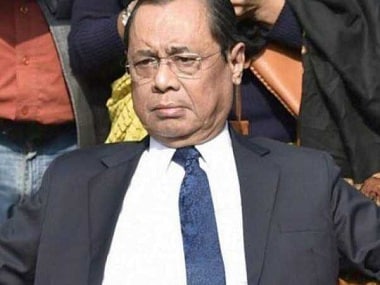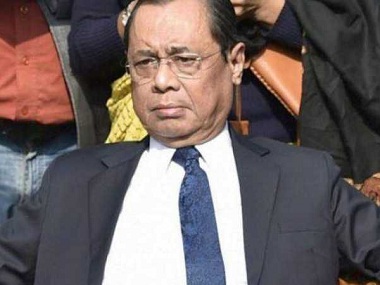It would be difficult to fathom a more glaring act of abuse of constitutional office than the one that was on display in the Supreme Court over the past two weeks. A former woman employee of the Supreme Court wrote a letter to the judges of the court, giving a fairly detailed account of how she was allegedly harassed and victimised by Chief Justice of India Ranjan Gogoi. What did the complainant want? Simply for the judges to take cognisance of her complaint and appoint an independent and impartial inquiry committee comprising retired judges of the Supreme Court examine the allegations. In a democracy run by constitutional values, this is the least one could have asked for. However, what happened since the receipt of the complaint until the conclusion of the ex parte, in-house inquiry proceedings is simply constitutionally intolerable. [caption id=“attachment_4885481” align=“alignleft” width=“380”]  File photo of Chief Justice of India Ranjan Gogoi. PTI[/caption] It does not take a constitutional law expert to point out that no man should be a judge in his own case. Or that both sides to a proceeding must be given a fair and equal opportunity of being heard, which includes legal representation. Nor is it unknown to anyone that there is a significant appearance of bias when members of an inquiry committee are subordinate to the person against whom the inquiry is to be conducted. More than the decision itself, the decision-making process has left such a deep scar on the Supreme Court that it will take years, if not decades, to completely go away. First, the respondent CJI used his administrative powers to convene a “special” bench, making himself a part of it. He then used his constitutional office to shield himself from allegations of a personal nature, imputed motives of the complainant, attempted to gag the media, and did not put his name on the 20 April order despite having presided over the bench. This was followed by the constitution of an inquiry committee headed by a male judge, with two women judges acting as members. All three members of the committee are subordinate to the respondent CJI and were appointed, as a matter of fact, to enquire into allegations made against their administrative boss. An external member, such as a senior advocate or an academic working in the area of women rights, was not part of the committee.
However, the attack to our democratic constitutional conscience did not stop there.
The complainant was denied legal representation without cause, was not given copies of her depositions , and was not educated on the procedure that the committee was to follow. This forced the complainant to withdraw from the proceedings. And instead of addressing the complainant’s concerns, the committee chose to proceed with a one-sided inquiry and ultimately dismissed the complaint as lacking in substance. Not only that, the committee refused to hand over its reasons and findings to the complainant citing an outdated judgment.
What does all this say about the country’s most powerful court?
That it does not care about fundamental rights of citizens, procedural due process or natural justice when it comes to one of its own. It is none other than the Supreme Court itself that laid down the Vishaka Guidelines in 1997 on how complaints of sexual harassment must be dealt with. And in the past two decades, the court handed down countless judgments acknowledging the care and sensitivity with which the issue of workplace sexual harassment must be viewed in India (one such judgment was authored by Ranjan Gogoi himself in 2012 in the case of Medha Kotwal vs. Union of India). It is a basic principle of rule of law that an inquiry should not and cannot take place under a veil of secrecy with no known procedure to be followed. In cases of sexual harassment, the woman complainant must have legal representation and a clearly spelled-out procedure must be followed. Witnesses must be summoned and an exhaustive fact-finding exercise must be undertaken. Last but not the least, the committee must educate the complainant about what legal options or remedies she has against the respondent and should, in fact, assist her in exploring those options.
None of this happened.
The committee took less than two weeks to come to the conclusion that there is no substance in the allegations made by the complainant. No reasons were disclosed to the complainant as to why the committee felt so. Did the committee summon and closely examine all the key witnesses? What did they depose before the committee? Did the committee take steps to ensure that the witnesses deposed before the committee without any fear or favour given that they were recording statements against the head of the institution where they work? There is no doubt then that the entire inquiry proceedings as well as the report of the committee is illegal and void ab initio. Whether or not it would be so declared by a court of law is a different matter. Needless to say, by not making the report public, the Supreme Court has sent a message to the people of this country that judges of India’s top court are beyond public scrutiny and accountability. Public confidence in constitutional courts is the bedrock of India’s democracy. When the Parliament or the executive fails to honour its duties and obligations, we, the people of India, turn to our constitutional courts with a lot of hope to realise our rights and liberties. Taken as a whole, the Supreme Court’s handling of the complaint calls for a genuine introspection about the future of the institution as a repository of public trust. For now, one way for the Supreme Court to prevent any further damage to its reputation is to recall its inquiry report and constitute a fresh inquiry committee headed by a retired woman judge of the Supreme Court, with retired Supreme Court judges and a women rights’ activists as members. The complainant must be entitled to legal representation and the committee must proceed in accordance with the Vishaka Guidelines (or the 2015 POSH Law). How can we expect sexual harassment to end if the Supreme Court itself does not take it seriously? The author is a lawyer


)

)
)
)
)
)
)
)
)



